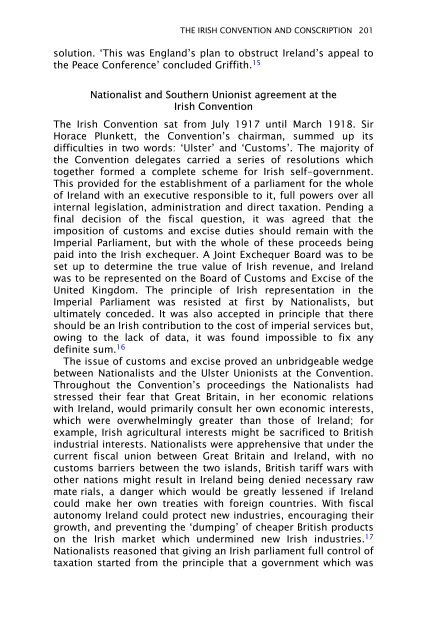Dividing Ireland: World War I and Partition
Dividing Ireland: World War I and Partition
Dividing Ireland: World War I and Partition
You also want an ePaper? Increase the reach of your titles
YUMPU automatically turns print PDFs into web optimized ePapers that Google loves.
THE IRISH CONVENTION AND CONSCRIPTION 201<br />
solution. ‘This was Engl<strong>and</strong>’s plan to obstruct <strong>Irel<strong>and</strong></strong>’s appeal to<br />
the Peace Conference’ concluded Griffith. 15<br />
Nationalist <strong>and</strong> Southern Unionist agreement at the<br />
Irish Convention<br />
The Irish Convention sat from July 1917 until March 1918. Sir<br />
Horace Plunkett, the Convention’s chairman, summed up its<br />
difficulties in two words: ‘Ulster’ <strong>and</strong> ‘Customs’. The majority of<br />
the Convention delegates carried a series of resolutions which<br />
together formed a complete scheme for Irish self-government.<br />
This provided for the establishment of a parliament for the whole<br />
of <strong>Irel<strong>and</strong></strong> with an executive responsible to it, full powers over all<br />
internal legislation, administration <strong>and</strong> direct taxation. Pending a<br />
final decision of the fiscal question, it was agreed that the<br />
imposition of customs <strong>and</strong> excise duties should remain with the<br />
Imperial Parliament, but with the whole of these proceeds being<br />
paid into the Irish exchequer. A Joint Exchequer Board was to be<br />
set up to determine the true value of Irish revenue, <strong>and</strong> <strong>Irel<strong>and</strong></strong><br />
was to be represented on the Board of Customs <strong>and</strong> Excise of the<br />
United Kingdom. The principle of Irish representation in the<br />
Imperial Parliament was resisted at first by Nationalists, but<br />
ultimately conceded. It was also accepted in principle that there<br />
should be an Irish contribution to the cost of imperial services but,<br />
owing to the lack of data, it was found impossible to fix any<br />
definite sum. 16<br />
The issue of customs <strong>and</strong> excise proved an unbridgeable wedge<br />
between Nationalists <strong>and</strong> the Ulster Unionists at the Convention.<br />
Throughout the Convention’s proceedings the Nationalists had<br />
stressed their fear that Great Britain, in her economic relations<br />
with <strong>Irel<strong>and</strong></strong>, would primarily consult her own economic interests,<br />
which were overwhelmingly greater than those of <strong>Irel<strong>and</strong></strong>; for<br />
example, Irish agricultural interests might be sacrificed to British<br />
industrial interests. Nationalists were apprehensive that under the<br />
current fiscal union between Great Britain <strong>and</strong> <strong>Irel<strong>and</strong></strong>, with no<br />
customs barriers between the two isl<strong>and</strong>s, British tariff wars with<br />
other nations might result in <strong>Irel<strong>and</strong></strong> being denied necessary raw<br />
mate rials, a danger which would be greatly lessened if <strong>Irel<strong>and</strong></strong><br />
could make her own treaties with foreign countries. With fiscal<br />
autonomy <strong>Irel<strong>and</strong></strong> could protect new industries, encouraging their<br />
growth, <strong>and</strong> preventing the ‘dumping’ of cheaper British products<br />
on the Irish market which undermined new Irish industries. 17<br />
Nationalists reasoned that giving an Irish parliament full control of<br />
taxation started from the principle that a government which was








